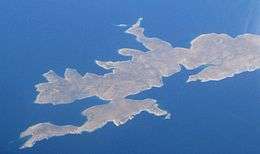Levitha
Levitha (Greek: Λέβιθα), known in classical antiquity as Lebinthus or Lebinthos (Ancient Greek: Λέβινθος) is a small Greek island located in the east of the Aegean Sea, between Kinaros and Kalymnos, part of the Dodecanese islands. It is part of the municipality of Leros. The island is mentioned in two of Ovid's works Ars Amatoria and the Metamorphoses in connection with the saga of Daedalus and Icarus. While escaping from Crete, Daedalus and Icarus flew over Lebinthus.[1] Besides Ovid, the island is noted by the ancient authors Pliny the Elder,[2] Pomponius Mela,[3] Strabo,[4] and Stephanus of Byzantium.[5] In addition, it is mentioned in the Stadiasmus Maris Magni.[6]
| Native name: Λέβιθα | |
|---|---|
 View of Levitha island | |
| Geography | |
| Coordinates | 37°00′40″N 26°27′35″E |
| Archipelago | Dodecanese |
| Administration | |
As of 2009, the population of the island is five - a family with two children and their grandmother. The total area of the island is 9.2 square kilometres (4 sq mi) and its total coast line length is 34 kilometres (21 miles).
Archaeological findings
In June 2019, archaeologists from the Greek culture ministry's Ephorate of Underwater Antiquities department discovered five 2000-year-old shipwrecks at the bottom of the sea near the Levitha island.[7][8] Along with the shipwrecks, a big granite anchor pole dating back to the 6th BC and amphorae dating back to the 3rd B.C were found. The amphorae were used during the era of the Ptolemaic Kingdom as a container for transporting goods such as wine. Archaeologists assumed that 400 kg weighted anchor pole was used on a “colossal-sized ship”.[9][10][11][12][13][14][15][16]
References
- Ovid, Metamorphoses 8.222; Ars Amatoria 2.81.
- Pliny. Naturalis Historia. 4.12.23.
- Pomponius Mela. De situ orbis. 2.7.11.
- Strabo. Geographica. x. p. 487. Page numbers refer to those of Isaac Casaubon's edition.
- Stephanus of Byzantium. Ethnica. s.v. Δρεπάνη.
- Stadiasmus of the Great Sea, 281
- Amazing archaeological discovery of 6th century BC anchor pole in Aegean Sea points to colossal ship
- "2,000-Year-Old Shipwrecks With Cargo Discovered Off Greek Island". Geek.com. 2019-08-09. Retrieved 2019-08-16.
- Hurst, Luke (2019-08-05). "Ancient shipwrecks discovered in the sea near small Greek island". euronews. Retrieved 2019-08-16.
- GCT (2019-08-06). "2000-year-old ancient shipwreck discovered in the Aegean Sea". Greek City Times. Retrieved 2019-08-16.
- Rogers, James (2019-08-09). "Stunning cargo-laden ancient shipwrecks discovered off Greek island". Fox News. Retrieved 2019-08-16.
- "Αποτελέσματα της Ενάλιας Αρχαιολογικής έρευνας στη νήσο Λέβιθα". www.culture.gr. Retrieved 2019-08-16.
- "Ancient Shipwrecks Discovered in the Aegean - Archaeology Magazine". www.archaeology.org. Retrieved 2019-08-16.
- "Amazing archaeological discovery of 6th century BC anchor pole in Aegean Sea points to colossal ship". Retrieved 2019-08-16.
- "Five major ancient shipwrecks discovered off small Greek island in the Aegean | Neos Kosmos". English Edition. 2019-08-07. Retrieved 2019-08-16.
- Ain, Noor ul (2019-08-06). "Ancient shipwrecks discovered in the sea near small Greek island". KENZ News. Retrieved 2019-08-16.
![]()